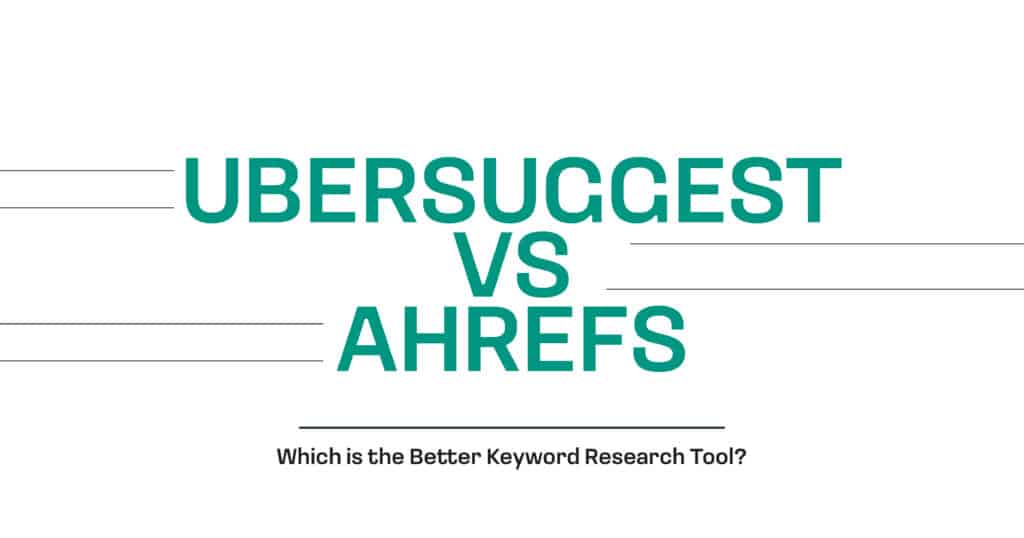When it comes to keyword research, two tools tend to dominate the conversation: Ubersuggest and Ahrefs. Both platforms promise deeper insights, more innovative SEO strategies, and better rankings – but which one truly delivers? You’re not alone if you’ve found yourself Googling “Ubersuggest vs Ahrefs” while staring at your marketing dashboard. Choosing the right keyword research tool can make or break your content strategy, especially when organic traffic is on the line.
In this blog, we’ll compare Ubersuggest and Ahrefs side-by-side – from keyword difficulty checkers to ranking tools, suggestions, and pricing. Whether you’re a solo creator or part of a growing digital team, you’ll get clarity on which SEO tool suits your needs – and why.
Ubersuggest and Ahrefs: Overview of the SEO Giants
Few tools are as widely recognized – and frequently debated – in the world of SEO as Ubersuggest and Ahrefs. Each offers a robust suite of features to help marketers, content creators, and businesses dominate the search engine rankings. However, while they serve similar goals, their approaches, pricing, and depth of data vary considerably.
Ubersuggest, created by digital marketing expert Neil Patel, is known for its accessibility and user-friendly design. It’s often favored by small businesses, beginners, and marketers looking for a budget-friendly option that still offers keyword suggestions, competitive insights, and site audit capabilities.
Ahrefs, on the other hand, is considered one of the most robust SEO tools on the market. It’s built for power users who want deep link analysis, comprehensive keyword data, and advanced rank tracking. While it comes at a higher price point, many professionals consider it an industry standard.
Keyword Research Tools: What Do They Offer?
Keyword research is the foundation of every SEO campaign – and the tools you use can shape your entire strategy. Ubersuggest and Ahrefs both aim to help marketers uncover high-performing keywords, but the way they approach research, planning, and insight delivery can feel very different.
If you’re comparing options, you’ll want to know how these platforms support search volume analysis, keyword difficulty scoring, and the ability to find untapped opportunities. While both cover the basics, each brings its own flavor and level of depth to the table.
Here’s what both platforms aim to help you with:
- Discover keywords relevant to your niche and audience intent
- Evaluate how hard it is to rank for those keywords
- Plan content ideas that align with popular search queries
- Uncover related phrases, long-tail options, and trending terms
- Understand the competitiveness and cost-per-click of each keyword
Keyword Suggestions, Generators, and Planning Features
When you’re generating keyword ideas, both Ubersuggest and Ahrefs have something valuable to offer, but they serve slightly different audiences. Ubersuggest focuses on accessibility and ease-of-use, while Ahrefs provides a data-rich experience with more filters, search intent analysis, and broader keyword sources.
Here are the key differences in how each tool handles keyword suggestions and planning:
| Feature | Ubersuggest | Ahrefs |
| Keyword suggestions | Basic keyword lists with related terms | Thousands of variations with advanced filters |
| Keyword difficulty score | Color-coded for easy understanding | Numeric scale with historical and SERP data |
| Search volume | Monthly volume from Google | Search volume + clicks + global/local options |
| Content ideas | Auto-generated content titles and questions | Topic clustering and parent topic suggestions |
| Search intent analysis | Minimal (basic categorization) | Detailed – separates by navigational, transactional, etc. |
| Keyword sources | Google-based only | Pulls data from Google, Bing, Amazon, and YouTube |
How Accurate Is Their Keyword Difficulty Checker?
When choosing between Ubersuggest and Ahrefs, the keyword difficulty checker is one of the most important tools for evaluating. This feature helps you estimate how hard it would be to rank on the first page of search results for a particular keyword. The more accurate the score, the more confidently you can build your content strategy around it.
Ubersuggest gives users a simple, color-coded difficulty rating (low, medium, high), which is great for quick decision-making. Ahrefs, meanwhile, offers a more detailed numerical scale (0–100), backed by data like referring domains, page-level backlinks, and historical SERP performance. The level of depth and transparency with Ahrefs makes it a go-to for marketers who want to dig into competitive landscapes.
Here’s what to keep in mind when using each tool’s difficulty score:
- Ubersuggest provides fast, beginner-friendly difficulty estimates that are easy to understand
- Ahrefs uses backlink profiles and domain authority to deliver more data-driven, nuanced scores
- Ubersuggest’s scores may feel more generalized or overly optimistic in competitive niches
- Ahrefs helps identify whether ranking will require new backlinks or stronger domain authority
- Both tools are helpful, but Ahrefs tends to be more reliable for high-competition or strategic SEO
SEO Keyword Analysis and Competitor URL Insights
Knowing which keywords to target is one thing, but understanding how your competitors rank for them is where the real strategy kicks in. Ubersuggest and Ahrefs offer features allowing you to spy on competitors’ top pages, traffic-driving keywords, and backlink sources. However, the depth and flexibility of those insights differ significantly.
Ubersuggest keeps things simple: you can input a competitor’s URL and instantly see their top-ranking pages, estimated traffic, and primary keywords. It’s useful for quick snapshots or identifying low-hanging opportunities. Ahrefs, on the other hand, turns competitive analysis into a powerhouse. It lets you reverse-engineer a full site strategy, from backlinks and keyword gaps to top-performing content and SERP movements over time.

Here’s what each tool brings to the table when analyzing competitors:
- Ubersuggest offers top-performing pages and keyword estimates with a basic interface
- Ahrefs provides full URL analysis, backlink details, and traffic breakdowns by keyword.
Ubersuggest’s data is best for light research or idea generation. - Ahrefs is ideal for deep dives into competitor content strategies, link profiles, and keyword targeting.
- Both allow domain-level and page-level comparison, but Ahrefs reveals more historical trends and performance over time
Which Platform Helps More With Strategic SEO Targeting?
If you aim to outsmart your competition and build a content roadmap that moves the needle, the strategic targeting tools matter. Ubersuggest is a great starting point – it gives you fast ideas and direction. But when it comes to identifying ranking gaps, uncovering untapped keyword clusters, or reverse-engineering a competitor’s growth path, Ahrefs delivers at a deeper level.
Here’s how they differ in supporting high-level SEO strategy:
- Ubersuggest helps brainstorm and validate simple keyword ideas with fundamental competitive insight.
- Ahrefs lets you build full SEO campaigns with keyword tracking, content gap analysis, and ongoing URL monitoring.
- Ahrefs becomes an essential part of the toolkit for brands and agencies planning long-term SEO efforts.
Small businesses or solopreneurs might find UberSuggest’s affordability and simplicity more than enough.
Maximize Your SEO Strategy With BloomHouse Marketing
Choosing between Ahrefs and Ubersuggest is just one step – crafting a winning SEO strategy takes more than just tools. At BloomHouse Marketing, we help businesses turn keyword data into meaningful results with tailored content plans, technical optimizations, and performance tracking that work.
Whether you’re aiming for local visibility, national rankings, or niche domination, our team knows how to connect the dots between insights and action.
Ready to elevate your SEO game? Contact BloomHouse Marketing and let’s build a strategy that drives traffic, conversions, and long-term growth.

FAQs
What are the key differences between Ahrefs and Ubersuggest in their keyword research capabilities?
Ahrefs offers a deeper, data-rich experience with more advanced filtering, broader keyword sources, and historical trends. Ubersuggest provides a more straightforward interface with essential insights – ideal for quick research or entry-level SEO.
How can I effectively use the competitor URL analysis feature in Ahrefs and Ubersuggest to improve my SEO strategy?
Both tools let you input a competitor’s URL to see what keywords they rank for and which pages drive traffic. Ahrefs further shows backlink profiles, keyword gaps, and ranking history – perfect for building a more strategic content roadmap.
Which tool provides a more accurate keyword difficulty checker, Ahrefs or Ubersuggest, and how can it impact my keyword strategy?
Ahrefs uses more robust metrics, factoring in backlinks and SERP-level data, making it generally more accurate, especially in competitive spaces. Ubersuggest’s scores are easier to interpret but may be less reliable for high-competition keywords.
What are the pros and cons of using Ahrefs and Ubersuggest to generate keyword suggestions and a plan?
Ubersuggest is more affordable and beginner-friendly, offering fast keyword ideas and content suggestions. Ahrefs provides much deeper insights, but it has a steeper learning curve and a higher price tag – it is best for advanced users and SEO pros.
How does the SEO tools comparison between Ahrefs and Ubersuggest affect their effectiveness as a keyword ranking tool?
Ahrefs offers detailed rank tracking and SERP analysis, making it a strong choice for long-term keyword monitoring. Ubersuggest includes basic tracking features, which are helpful for light SEO campaigns or small businesses.









